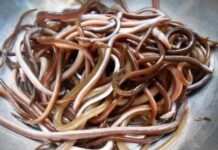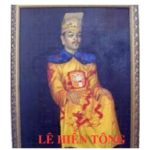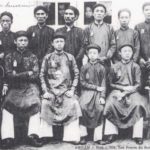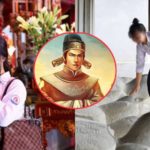This is a king or text
Tự Đức (1829-1883) was the fourth emperor of the Nguyen Dynasty, and the son of Emperor Thieu Tri. He ruled the country for 36 years (1847-1883) and was the longest-reigning emperor among the 13 emperors of the Nguyen Dynasty.
Tự Đức was the most literate emperor of the Nguyen Dynasty. According to some documents, during his lifetime, the emperor composed over 4,000 poems. He was skilled in literature and was hardworking, but unlike the previous period, the Nguyen Dynasty under Tự Đức’s reign gradually weakened. It was during his reign that Vietnam fell into the hands of French colonialists.

The king with the most wives in Vietnam
Tự Đức was the longest-reigning emperor of the Nguyen Dynasty, ruling for 36 years from 1847 to 1883. Despite having 103 wives, he did not have any biological children due to childhood illness and poor health.
He adopted three nephews as his foster children: Ung Chan, Ung Duong, and Ung Dang. Ung Chan was the son of Prince Hong Y and was entrusted to Empress Vu Thi Duyen Hai, the chief wife of Emperor Tự Đức, for upbringing. After Tự Đức’s death, Ung Chan ascended to the throne and became known as Emperor Duc Duc.
Ung Duong (also known as Ung Ky or Ung Bien) was the son of Prince Hong Cai and was entrusted to Concubine Nguyen Thi Cam for upbringing.
Ung Dang was also the son of Prince Hong Cai and was entrusted to Concubine Nguyen Thi Huong for care and education.
Offering a bamboo whip as punishment for his mother
In the book “Chin doi chua, muoi ba doi vua triều Nguyễn” (Nine generations of lords, thirteen generations of emperors of the Nguyen Dynasty), it is said that one day when Emperor Tự Đức was free, he went hunting in the forest of Thuan Truc (Kim Long) and encountered a flood, unable to return in time for the upcoming ancestral ceremony of Emperor Thieu Tri. Seeing that the king had not returned, Duc Tu Du became anxious and sent high-ranking official Nguyen Tri Phuong to escort him.
Knowing that the queen was worried, upon arriving at the palace late at night, the king quickly went on the sedan chair straight to the palace, begging for forgiveness. Duc Tu Du sat with his back to the curtain, not saying a word.
Emperor Tự Đức then took a bamboo whip and offered it to be placed on the seat, lying down to receive the punishment. After a while, Duc Tu Du turned his face and waved his hand, saying: “Stop, forgive! Go and have fun so that the officials have a hard time, then reward them, and tomorrow morning go to attend the ceremony.”
After leaving the palace, on that very night, the king stayed up very late at Cần Thanh Palace to fulfill his mother’s teachings.
Due to his special affection for his mother, Tự Đức is considered the most filial king in the history of feudal Vietnam. As he had no heir, after Emperor Tự Đức’s death, the Nguyen Dynasty went through a dark period of having 3 kings within 4 months. Immediately after that, in 1885, the capital city fell, resulting in a complete defeat for the court of Hue and the loss of thousands of lives.
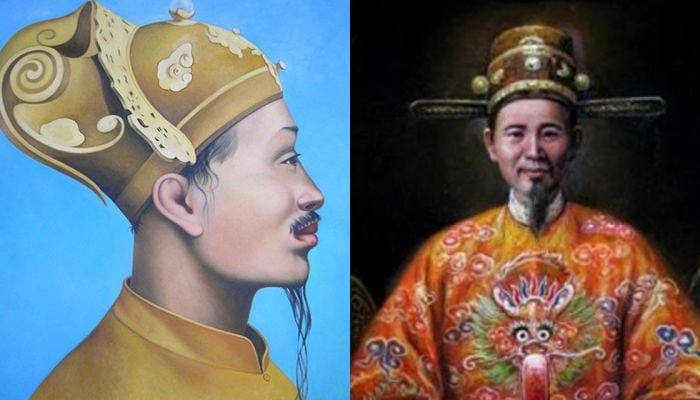
During the reign of Emperor Tự Đức, was literary or martial arts more highly regarded?
The book “Nearly 400 years of kings in the Nguyen Dynasty” records that during the reign of Emperor Tự Đức, literary arts were much more highly regarded than martial arts. Tự Đức had a passion for literature from a young age. He himself was a poet. When he ascended the throne, in addition to the already established examination subjects from the time of Gia Long, such as poetry composition and examination, he also added the subjects of elegant and talented scholars to select talented writers for official positions. Therefore, during Tự Đức’s reign, literature flourished, and many talented poets emerged, such as Cao Bá Quát, Nguyệt Đình, and Huệ Phố. Within the royal family, the king held a special respect for relatives with literary talent. Tự Đức also paid attention to martial arts. In 1865, he established the examination subject of Doctorate in Martial Arts. But in general, under the reign of Tự Đức, martial arts were not as highly regarded as literary arts. There is a folk saying: “The buffalo hates the buffalo that eats grass / The martial artist hates the scholar in long robes.” This verse reflects the inferiority of martial arts compared to literature, which is quite paradoxical because during the period of French colonization, the focus should have been on martial arts. Compared to the time of Gia Long, the organization of national defense under Tự Đức was almost the opposite. The military was no longer given priority in terms of resources, and the financial situation was tight. The majority of martial generals no longer held key positions in the court. Most martial generals with military achievements (such as Nguyen Tri Phuong) came from literary backgrounds.
Which Vietnamese family name has the most Trạng Nguyên throughout Vietnamese history? Those who possess this name should be proud!
Do you know which family name has the most number of people named Trạng Nguyên in Vietnam? Let’s find out!

























